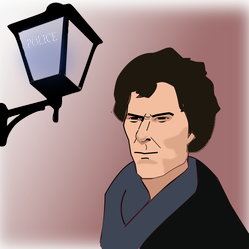"I am a high functioning sociopath," Sherlock announces proudly. Although the Original character penned by Sir Arthur Conan Doyle was not really sociopathic, he was undeniably unique and separated from normal people by his abilities. This Sherlock, however, seems quite happy with his life, cut off from normal human emotional problems.
Funnily enough, this is something that gradually changes through the first, second and third series (seasons). He becomes more human, due largely to his growing friendship with John Watson, and to the mothering influence of Mrs Hudson. Many of the original character's deductions involved an empathetic understanding of human emotions, so how does our high functioning sociopath compensate for this gap in his personality?
Quite simply, by using his Mind Palace. Sherlock's mind contains a gigantic vault of information on almost everything. In that vault are many observations of human behavior made by experts in the field of psychology. Dispassionately, he can understand human emotions in a textbook fashion, a sort of: slot B joins onto tab C kind of way. Whether he really is a sociopath or has just built a protective wall around himself is open to debate.
Essentially, though, he is basically the original Sherlock Holmes, the same one-man band detective. Although he does occasionally get help from Molly the pathologist and from the police forensic department. Additionally, he has powerful tools that the original character could never have dreamed of - a smartphone and a computer.
The creators and writers, Mark Gatiss and Steven Moffat, are quick to acknowledge the original genius of Conan Doyle in producing such an amazing character.








 Enjoy Free Flying Lessonson 05/25/2014
Enjoy Free Flying Lessonson 05/25/2014
 Create Cartoon Animation for Freeon 05/23/2013
Create Cartoon Animation for Freeon 05/23/2013
 Buying a Snooker Tableon 03/18/2013
Buying a Snooker Tableon 03/18/2013
 Snooker and Pool Aiming Techniqueson 02/22/2013
Snooker and Pool Aiming Techniqueson 02/22/2013



Comments
That's fine Jo.
I've got a Sherlock article on my list of Things To Write, but you did cover the ground here. I was going to do about the cast real world relationships. I might still do it eventually, but link your article in, if you don't mind.
I really appreciate your dropping by, Jo. You must be the busiest person on Wizzley. I'm glad you enjoyed the article, and thanks for the kind comments.
I thought I'd read everything, considered every angle and knew every facet. You've just proved me wrong. I thoroughly enjoyed this, thanks! It's taken me this long to get here, as I was exploring all of the follow on YouTube clips, after watching the ones that you added. Brilliant show!
Thanks for the feedback. I know that Sherlock isn't everybody's cup of tea. I guess I am captivated by the dialogue, the humor, the acting and the fact that I can't guess what is going to happen next.
The episode that impressed me the most was The Reichenbach Fall. I have never seen the idea explored before where a man's reputation is so meticulously picked apart to the point where even we the audience are not sure if Sherlock is genuine or a fake.
I would encourage you to give it another go with season two, and thanks again.
Interesting, well-written article, but it didn't change my mind about the series. I watched the first season on DVD and found it both boring and superficial, and too frenetic. Two things you mention are part of what's wrong with it, from my point of view. First, the seasonal arc, because when a series boils down to a formula, that's when it loses my interest. Most viewers want novelty surrounded by predictability, which is what tv is primarily all about.
Second, words flashing on the screeen -- stolen from I don't know how many places, including A Beautiful Mind and the vampire movie with Night in the title (sorry for my bad memory). Every time I run into that feature, I have to work to ignore it because it’s so distracting.
I admired Cumberbatch’s acting long before most Americans had even heard his name, so learning that he was committed to this flashy lightweight series and probably wouldn’t have the time for movies was disappointing.
Maybe if I were already a Holmes fan, I might have been enticed into it. But even then I don’t think so.